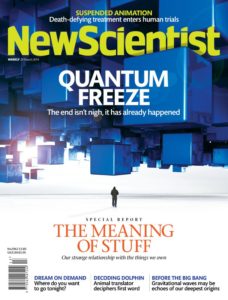Published in New Scientist, 29 Mar 2014
Lightspeed is no limit in the quantum world – so why can’t we exploit that freedom? Perhaps because we’re living in the dead husk of a richer cosmos
 AS ENDINGS go, it is a bit of an anticlimax. As the universe enters old age, its stars burn out. Slowly, the temperature across the cosmos reaches equilibrium. With no heat flowing, thermodynamic laws make it impossible to transfer energy in a useful way. Nothing interesting or productive happens any more. Everything creaks to a standstill.
AS ENDINGS go, it is a bit of an anticlimax. As the universe enters old age, its stars burn out. Slowly, the temperature across the cosmos reaches equilibrium. With no heat flowing, thermodynamic laws make it impossible to transfer energy in a useful way. Nothing interesting or productive happens any more. Everything creaks to a standstill.
This “heat death” of the universe was a favoured topic of the gloomier sort of 19th-century physicist. These days, we console ourselves that, if it is to happen, it will not be for many, many multiples of the current age of the universe.
Antony Valentini, a theoretical physicist at Clemson University in South Carolina, is less sanguine. For the past two decades, he has championed the idea that something like heat death has already happened – not in our layer of reality, admittedly, but on an underlying level that we are hard-pressed to see.
Fundamental physics is not short of eccentric and unworkable proposals, and it is easy to dismiss such a bold suggestion. But there are aspects of Valentini’s idea that make some of his peers believe he might just be on to something. Just as a thermodynamic heat death would prevent us from doing anything useful with energy in the distant future, if Valentini’s “quantum death” has happened, it could explain our puzzling inability to fully get to grips some of aspects of nature – those to do with quantum behaviour. “He’s well respected and taken seriously,” says Carlo Rovelli of Aix-Marseille University in France.
Now Valentini thinks he may have seen the first evidence for this theory, etched in the afterglow of the big bang. Strange as it might seem, quantum death might breathe new life into our understanding of reality. […]
The rest of this article is available here.